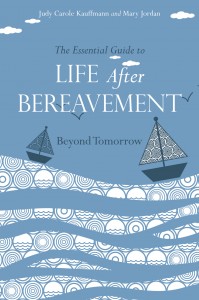In every Bereavement and Loss workshop that I have facilitated over the years, regardless of the role of the participant, the question of universal interest seems to be ‘what do we say when we don’t know what to say?’

Everyone it seems is afraid of saying the wrong thing, and the more tragic the loss the greater our fear. So why is it so hard for us to know what to say when someone has been bereaved? Is it possible to say the wrong thing? Does it matter what we say, as long as we convey by our tone of voice and facial expression the fact that we care?
In both my personal and profession experience there are certain phrases and actions that are more helpful than others, but without any shadow of doubt the worst action of all is no action at all.
Because we don’t know what to say, we may go out of our way to avoid the person who has been bereaved by literally or figuratively crossing the road to avoid them. Thus we are in a sense punishing them for something that was out of their control. We are isolating them at a time when they most need support. Sometimes all that sustains the person going through a crisis is the knowledge that other people care. They need to be wrapped in a symbolic blanket of love and support. So, how can we best comfort those in emotional pain?
‘I don’t know what to say’ and ‘I’m so sorry to hear’ are quite helpful expressions and cover most eventualities; ‘I wish I knew what to say’ is another variation on the theme.
‘Is there is anything I can do?’ needs to be backed up with something concrete. For example ‘if there is anything I can do this is my e-mail’ (for a work environment) on a personal level you could say ‘I am not working on Monday, would you like to meet for coffee?’ Alternatively ‘I’m going to the supermarket can I do any shopping for you?’ or ‘would you like me to pick up your kids from school?’ if appropriate.
Practical offers of help are often welcome and much more helpful than an empty ‘if you need anything don’t hesitate to call me’ which often makes the speaker feel virtuous, but leaves the recipient unfulfilled and unlikely to take up your offer believing, possibly correctly, that it is not meant.
If the bereaved person says ‘I miss him/her so much’ a reasonable response could be ‘what do you miss most about him/her?’ allowing the person the opportunity to talk about their loss rather than trying to change the subject.
Trying to jolly them along with comments such as ‘but you have two lovely children/grandchildren to take your mind off him/her’ is not helpful. It may make you feel better because you have said something to ‘cheer them up’ but you will not be helping them at all.
The ‘why did this happen to me?’ type of unanswerable questions that many professional and non professional carers fear, can be answered with ‘I wish I knew the answer’ or ‘I wish I knew what to say that would help’
The point is that is not essential to have an endless supply of wise words. The person you are with needs to know that you care and that you want to be supportive. It is not necessary to have a brilliant philosophical response.
The importance lies in being there and being able and willing to really listen, giving that person your whole attention.
To truly give someone your full attention without interrupting them is a gift, and if you can listen without giving them your unsolicited advice, your experiences, or what your neighbour did in similar circumstances, it is a rare gift indeed.
Judy Carole Kauffmann is the co-author of The Essential Guide to Life after Bereavement – Beyond Tomorrow (Jessica Kingsley July 2013) and End of Life the Essential Guide to Caring (Hammersmith Press 2010). She facilitates workshops on Bereavement and Loss and can be contacted on 07919 072111. I f you’d like to find out more about her work, visit End-of-Life Management.